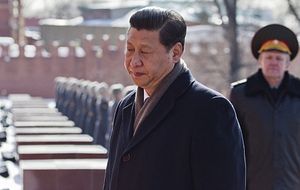Over the last two years China’s anti-corruption campaign has employed a uniquely Chinese strategy of “shock and awe,” achieving significant results across different sections of the Party, the government, and the military. Yet it has not achieved the “decisive victory,” as Chinese president Xi Jinping noted. To further demonstrate China’s determination against corruption, Xi Jinping recently stated that there is no upper limit for the anti-corruption campaign — implying that bigger “tigers” would be exposed, possibly in 2015. Xi’s remarks corrected the popular misunderstanding in Chinese society that the campaign would pause for a period of time.
To properly understand China’s anti-corruption campaign, one needs to understand the three stages theory outlined by the Party after the 18th party congress. The theory consists of the three nos: say no to corrupting others, say no to succumbing to corruption yourself, and say no to thoughts of corrupt behavior. To achieve the “do not dare to corrupt” stage, the emphasis should be on punishment mechanisms; the latter two stages, however, need institutional and cultural mechanisms respectively. The last stage (“do not want to corrupt”) is the hardest one to achieve as it relies more on people’s inner morality and values. This is also why the Party has emphasized that anti-corruption is always “on the road,” cautioning against any complacency among party members.
Moreover, China’s anti-corruption campaign is more than just anti-corruption. The reason is very simple: corruption is always deeply connected with other political and social problems in China. Corrupted officials employ more corruption to stay in power and even seek to challenge and alter China’s reform plan. A good case in point is Zhou Yongkang and Bo Xilai’s conspiracy to grab ultimate power to “do big things,” i.e., alter Deng Xiaoping’s reform and opening theory and practice. In this sense, corruption is never simply corruption per se; it is the ultimate symptom of anti-reform forces.
To consolidate the gains so far achieved and further deepen the campaign to ultimately establish a new political culture, strong leadership at all levels of the Chinese government is needed. The Central Commission for Discipline Inspection (CCDI), currently under Wang Qishan’s strong and able leadership, should continue to play a central role in this campaign, in spite of some outside concerns about his age. In the meantime, other institutional mechanisms should be properly established to ensure that a new political culture can emerge. For example, the CCDI’s new TV series on anti-corruption is a creative new start and has become an instant national hit. According to some reports, four institutional mechanisms are currently under construction: a mechanism of internal monitoring within the Party; a leadership selection monitoring mechanism; a public and society monitoring mechanism; and a state-owned firms monitoring mechanism.
Of course, there always will be outside voices raising all kinds of concerns about Xi and Wang’s anti-corruption campaign. Some of these concerns, such as claims the campaign is a political purge, result from misunderstandings of Chinese politics and Chinese public opinion. If there is a political purge, it is a purge of corrupted officials only; the Chinese people would welcome such a “purge.” Other critics who want to see an immediate end to all corruption in China are either naïve or politically motivated. Everyone is equal before the law. Just because some groups or members have not been punished yet does not mean that they will escape from the anti-corruption campaign. Some other concerns are just disguised efforts to discredit and even seek to derail the anti-corruption campaign. Some officials have chosen to ignore their duties and obligations since they could not gain illegal benefits from performing these duties. Such administrative inaction could be more serious than outright corruption as it is harder to punish.
The Chinese leaders remain sober-minded. They know that it could take decades to truly build a new political culture and eliminate corruption. But the vast majority of Chinese people firmly stand behind Xi, Wang, and their colleagues and this is the ultimate reason why China’s anti-corruption campaign will succeed. The outside world should listen to the voices of common Chinese people before casting their cynicism on China’s anti-corruption campaign.

































